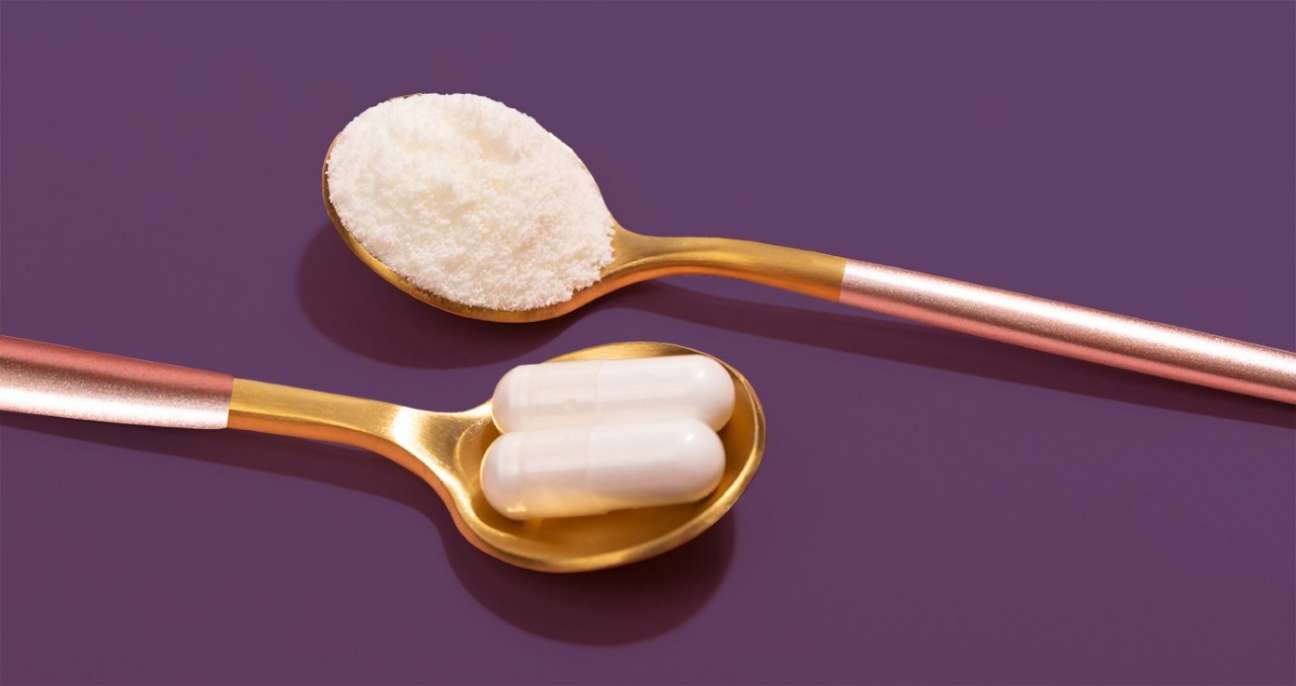Collagen supplements
Collagen supplements
Collagen is a protein found in connective tissues throughout your body. It is located in our skin, bones, tendons, and ligaments. Several studies have shown that taking collagen supplements may benefit specific parts of the body, including: skin, bone density, and joint health. Collagen also helps with blood clotting, wound healing, and protects the nervous system.
The body is capable of producing all collagen with a balanced diet. Therefore, dietary supplements may not be necessary for everyone.
However, as we age, our bodies make less collagen, so some people need more for certain health benefits or to help treat collagen deficiencies or other conditions.


There are 3 common types of collagen:
1. Hydrolyzed Collagen: Collagen hydrolysate is derived from bovine, seafood, poultry, swine and other animal sources and it is broken down into smaller and more easily absorbed peptide particles. Hydrolyzed collagen is the popular form because it is more easily absorbed than other types. It's usually sold in capsule or powder form and you can add it to drinks, soups, and even baked goods or other foods. A 2019 review of clinical studies found that taking 2.5–15 grams of hydrolyzed collagen peptides daily may be safe and effective. Daily doses of less than 2.5 grams may be beneficial for joint pain, skin health and hydration. Increasing this dose to 5 grams per day has the potential to improve bone density. Daily doses greater than 15 grams of the peptide are primarily used to improve muscle mass and body composition.
2. Non-denatured collagen: common in chicken cartilage. Several human studies have suggested that doses of 10–40 mg of non-denatured collagen per day may improve joint health.
3. Gelatin: is cooked collagen, found in animal foods, often used as an ingredient in desserts. It can also be added to sauces, soups, smoothies and other foods for an extra boost of collagen protein. There is very little research to support specific dosage recommendations for this use. Therefore, it is best to refer to the servings listed on the package before using as a supplement. Most collagen supplements have a suggested daily dosage printed on the packaging. Powdered supplement packaging often suggests 1–2 scoops per day, while oral tablets or gummy supplements may recommend 1-2 servings. Depending on the supplement, these servings can vary significantly in collagen content, so check the nutrition facts label for detailed dosage information.
There is currently no officially recommended dose of collagen per day. So the amount consumed depends on the form you're taking and the reason you're taking it.

Some studies on the effects of Callogen:
Skin Health
Collagen makes up 75% of the dry weight of your skin. As you age, your skin's inner layer loses collagen and becomes less elastic and more vulnerable to damage. Studies on collagen's impact on the skin include:
√ Hydration: In a 2015 study, scientists evaluated if supplementation could improve skin tissue in a lab setting. Their results suggested that supplements could improve skin hydration and the skin's collagen network. In addition, collagen also showed potential to improve aging skin.
√ Elasticity: Skin elasticity starts to decline in your 20s. Some studies have focused on whether collagen supplements can help with this. In a 2014 study in Skin Pharmacology and Physiology, women ages 35 to 55 took either a collagen supplement or a placebo (fake treatment) once daily for eight weeks. At the study's end, those who took the collagen had improved skin elasticity compared to those who took the placebo.
√ Hydration and elasticity: A 2018 study published in Nutrition Research investigated the role of a specific brand of oral collagen supplement. This supplement also contained joint-supporting ingredients, including chondroitin sulfate, glucosamine, L- carnitine, and other vitamins and minerals. The research showed the supplement increased skin elasticity and hydration.
√ Wound healing and aging: Lastly, a 2019 review of studies evaluated collagen supplements' effects on wound healing and skin aging. Study authors concluded that supplements are generally safe and can increase skin elasticity, hydration, and density. They added, however, that further studies are needed to determine proper dosing and determine medical applications.

Bone Health
Studies on collagen supplements' impact on postmenopausal bone health are conflicting. So, it is unclear whether collagen supplements can improve bone health. Study findings include:
√ No effects on bone health: In a 2010 study published in Maturitas, researchers found that collagen supplements did not improve bone health in postmenopausal people. For the study, 71 women with osteopenia (low bone density) took either collagen supplements or a placebo every day for 24 weeks. Results revealed that the collagen supplements did not produce any effects on bone metabolism.
√ Increased bone mineral density: A 2018 study published in Nutrients concluded that the intake of a specific collagen supplement brand increased bone mineral density in postmenopausal women. In addition, the study concluded that supplementation might increase bone formation and reduce bone loss.
You can't choose where your body will use collagen. For example, you might take a collagen supplement to improve your skin, but if your bones or your muscles are collagen-deprived, extra collagen will likely be used by your bones and muscles first.

Body Composition
Some people may take collagen to preserve muscle or decrease fat. However, studies on this are limited and have provided mixed results. Among them:
√ Muscle: A 2019 study published in Nutrients investigated if collagen supplements combined with resistance training could affect the proportion of fat to non-fat in your body (body composition) in active men. A 12-week program with 57 participants combined resistance training with either collagen supplement or a placebo. Researchers found that both groups increased muscle to the same extent. However, those who took a collagen supplement showed a slight increase in fat-free mass. This was thought to be related to improvements in connective tissue.
√ Lean body mass: Another small trial compared hydrolyzed collagen protein supplements to whey protein supplements in older women. The 2009 study published in the Journal of the American Dietetic Association found that taking hydrolyzed collagen supplements may help maintain lean body mass.

Joint Pain
Collagen helps stimulate production of cartilage, a rubbery material that covers and protects bones and helps joints move smoothly. Production of both of these declines with age. There is some evidence that collagen supplements may reduce joint pain and other symptoms of osteoarthritis.
Heart Disease
Some people take collagen supplements to boost heart health, although there is limited independent research to support this. Researchers affiliated with a Japanese company that makes collagen-based functional foods published a study in 2017. They concluded that when taken regularly for six months, collagen tripeptide offered heart benefits, including:
√ Improved cholesterol levels
√ Reduction of other risk factors for atherosclerosis (hardening of the arteries).


Other Uses
Some people also take collagen supplements to improve other aspects of their health, including:
√ Eye health
√ Weight reduction
√ The appearance of skin and nails
However, little evidence is available to support these benefits.
Compiled and penned by Crocus Media
